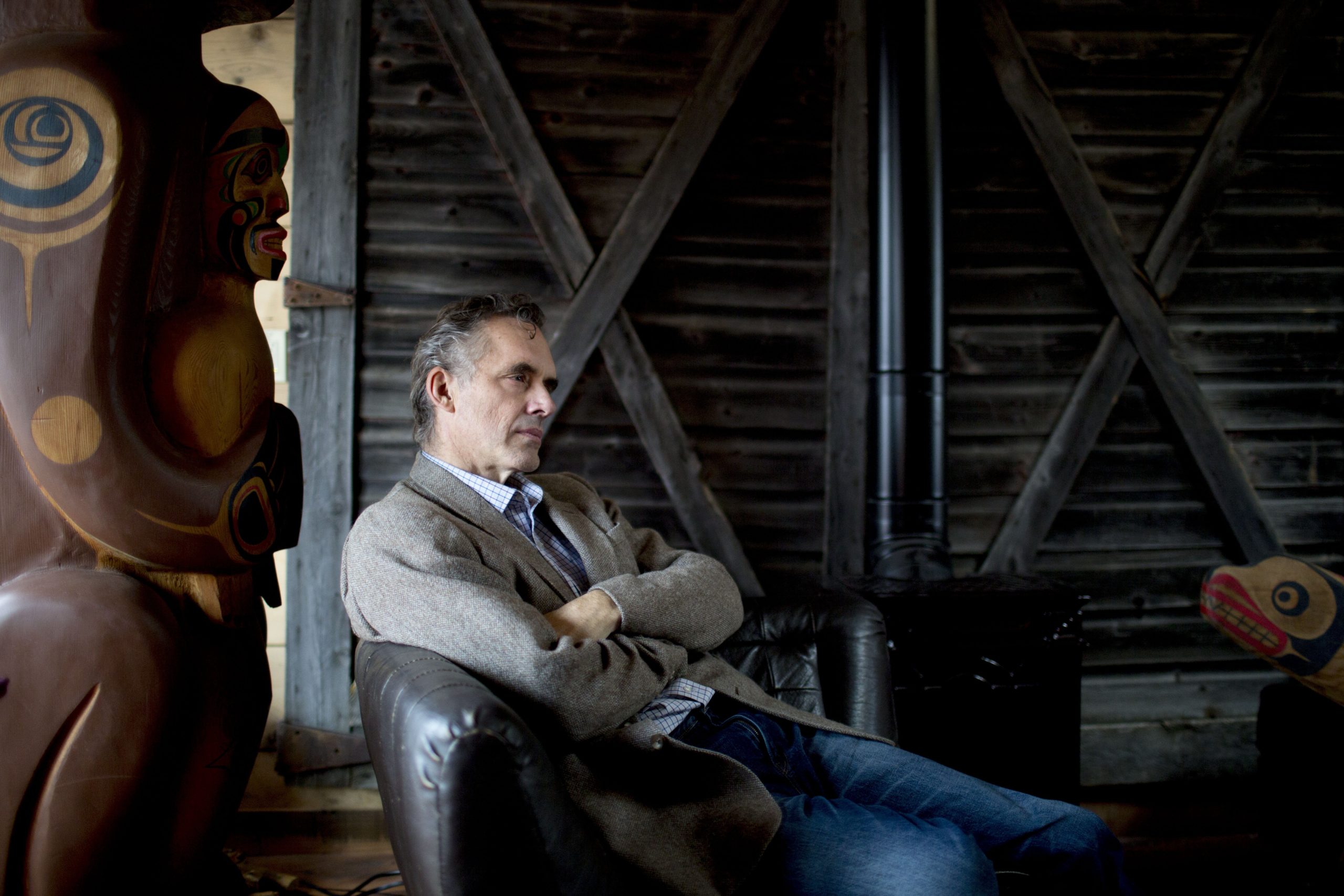Warning: The following contains major spoilers for the film Don’t Worry, Darling (2022).
Jordan B. Peterson is in touch with his emotions. The emeritus professor of psychology first rose to internet stardom in a simpler time, when online clips of crazy left-wingers still just showed them throwing hissy fits on campus (not looting convenience stores en masse or burning cities to the ground). In the latest viral video, though, it’s Peterson himself who’s been reduced to tears.
Right near the end of a 45-minute interview this week, British journalist Piers Morgan asked Peterson about recent comments by actress-turned-director Olivia Wilde. Wilde’s latest film, Don’t Worry, Darling, features a charismatic villain portrayed by Chris Pine. In a recent Q&A about the movie, Wilde explained that she had “based that character on this insane man, Jordan Peterson, who is this pseudo-intellectual hero to the incel community.”
She described that community, further, as “disenfranchised, mostly white men, who believe they are entitled to sex from women…[who] believe that society has now robbed them—that the idea of feminism is working against nature, and that we must be put back into the correct place.”
Wilde continued: “But this guy Jordan Peterson is someone that legitimizes certain aspects of their movement because he’s a former professor, he’s an author, he wears a suit, so they feel like this is a real philosophy that should be taken seriously.”
“Is that you?” Morgan asked. “Are you the intellectual hero to these people?”
Peterson answered flatly: “Sure, why not? People have been after me for a long time because I’ve been speaking to disaffected young men. What a terrible thing to do that is.”
He took a long pause while fighting back tears, and then:
I thought the marginalized were supposed to have a voice…. It’s very difficult to understand how demoralized people are, and certainly many young men are in that category. And you get these casual insults—“these incels”—what does that mean? These men, they don’t know how to make themselves attractive to women, who are very picky—and good for them; women, be picky. That’s your gift, man. Demand high standards from your men. Fair enough. But all these men who are alienated…they’re lonesome, and they don’t know what to do. And everyone piles abuse on them.
I am not sure that “incels” as such really exist, but there is no doubt something very rotten in the way men and women interact today. Partly this is relational, a problem with the dynamics themselves; but it is also founded in the respective crises of men and women in the postmodern world, in misconceptions of identity and nature.
Peterson belongs to a peculiar class of intellectuals—present on the right for as long as it has existed—who recognize the root of social ills in the failure to find meaning, but fail to grasp (or even ask) what a recovery of such meaning would look like in substance and practice. Peterson in particular has always been focused on the structures and processes of meaning, dating back to his early academic works. And so the object of his later thought has been something like a reified order. But it is also a minimal order: not the reconfiguration of human society into conformity with divine law; just the moral imperative to clean your room.
Peterson, like Morgan, is a reactionary liberal: he hopes to restore some of the virtues of the premodern and early modern worlds without moving beyond or against the social and political arrangements of late modernity. If he wants to turn back the clock at all, it’s not by very much. When asked what he found admirable in England, he pointed to the common law, the tradition of free speech, and self-effacing humor.
Maybe he doesn’t have all the answers. (He doesn’t.) But what real harm has Jordan Peterson done?
If there is a genuine problem here, it’s hard to locate the fault with the professor. So it’s worth turning to Olivia Wilde—and to her very strange new film.
Don’t Worry, Darling has drawn unfavorable comparisons to Get Out, the 2017 Jordan Peele flick that set off the current craze over social-commentary horror. Don’t Worry, Darling at least has this going in its favor: it achieves some modest success in its efforts at atmospheric horror, whereas Get Out wound up laugh-out-loud funny every time it reached for a scare. Wilde’s film is especially clever in its use of sound to that effect.
But Get Out and its follow-ons have been bad not just because they fail to scare, and not just because they fail as stories, but because they are all remarkably heavy-handed, remarkably clunky works of far-left propaganda. On this front, Wilde outpaces the competition by a mile.
Don’t Worry, Darling broadcasts like the product of a very troubled mind. It follows happy, carefree housewife Alice (portrayed by Florence Pugh) as she begins to ask unwelcome questions about her cartoonishly idyllic setup. Alice lives with her husband, Jack (Harry Styles), in a midcentury company town called Victory, California. Victory is run by Frank—Chris Pine’s Peterson-esque villain—the brilliant but mysterious head of an unidentified enterprise. Every day, the men drive off in beautiful cars to work at Victory Headquarters. The women ride a trolley into town to shop, expensing everything to their husbands’ accounts. They return home to cook, clean, and take care of other business. Those who have kids welcome them home off the school bus every afternoon.
A series of events set off by Alice’s former friend Margaret, who lost her son in the desert beyond Victory and now seems to have lost her mind, causes Alice’s life to unravel. She draws first the attention and then the anger of the enigmatic Frank—who has Peterson’s charm, his habit of talking with his hands, a version of his soft Canadian English, and all the cunning brutality Wilde must imagine the professor to possess. He even speaks often, in a kind of lowbrow Peterson ripoff, of the need for men to choose order over chaos. Alice becomes his girlboss nemesis, intent on exposing the lie behind the seeming utopia of Victory.
Pugh had an impressive understated-horror turn in Ari Aster’s masterful Midsommar (2019), so she ought to have had the chops for this kind of role. As Alice, though, she fell flat—equal parts unconvincing and unlikable.
That wasn’t her fault. In the film’s third act, the reason for all the weirdness and inconsistency becomes clear: Wilde was building to a ridiculous final plot twist.
Victory is a simulation. In the real world, Alice was a successful surgeon. She even had a smartphone. Jack was her deadbeat husband, poorly dressed with a patchy beard, who spent his days at home listening to podcasts. One day, when Alice refused to have sex with Jack after a 30-hour shift, he knocked her out and placed her in the simulation against her will. Frank, we learn, operates this whole virtual reality; the other men are all like Jack, and the women (with at least one exception) are all prisoners like Alice. It is a less-than-subtle commentary on the domestic oppression women supposedly endured up through the middle of the twentieth century.
Perhaps the most remarkable thing about Wilde’s delusion is just how hackneyed it all is. Men are evil. Housewives are oppressed. The goods of family life are all illusory. This is no groundbreaking radicalism; it is what feminism always has been, and always will be.
Subscribe Today
Get weekly emails in your inbox
But it’s also worth noting just how bleak is the vision of liberation Wilde offers: if only you could see beyond the veil of domesticity, you too could break into the world of 30-hour shifts and soul-crushing exhaustion. You, too, could find yourself tied to a sloppy bum—a man deprived of masculinity because he is deprived of a masculine society—who has all of the vices and none of the virtues of the men in the simulation. You, too, could live in a dark urban apartment instead of a beautiful suburban house. You, too, could hate your husband (who deserves it). You, too, could find yourself bizarrely mismatched, in one way or another, to every aspect of your life—disaffected, demoralized, and alienated, to use Peterson’s words.
The great irony here is that Wilde seems confused about which world is the natural state of men and women and which is a dangerous lie imposed by force.
In the end of Don’t Worry, Darling, Alice finds her way out of the illusion. We hear her, in the movie’s final moment, wake up and take one first, gasping breath in the real world. God willing, her creator may just one day do the same.
Read More: www.theamericanconservative.com









 Bitcoin
Bitcoin  Ethereum
Ethereum  XRP
XRP  Tether
Tether  Solana
Solana  Dogecoin
Dogecoin  USDC
USDC  Cardano
Cardano  Lido Staked Ether
Lido Staked Ether  TRON
TRON  Avalanche
Avalanche  Sui
Sui  Wrapped stETH
Wrapped stETH  Toncoin
Toncoin  Stellar
Stellar  Shiba Inu
Shiba Inu  Chainlink
Chainlink  Wrapped Bitcoin
Wrapped Bitcoin  Hedera
Hedera  Polkadot
Polkadot  WETH
WETH  Bitcoin Cash
Bitcoin Cash  LEO Token
LEO Token  Uniswap
Uniswap  Litecoin
Litecoin  Pepe
Pepe  Hyperliquid
Hyperliquid  Wrapped eETH
Wrapped eETH  NEAR Protocol
NEAR Protocol  USDS
USDS  Ethena USDe
Ethena USDe  Aptos
Aptos  Internet Computer
Internet Computer  Aave
Aave  Mantle
Mantle  POL (ex-MATIC)
POL (ex-MATIC)  Ethereum Classic
Ethereum Classic  Cronos
Cronos  Render
Render  MANTRA
MANTRA  Monero
Monero  Bittensor
Bittensor  Artificial Superintelligence Alliance
Artificial Superintelligence Alliance  Tokenize Xchange
Tokenize Xchange  Dai
Dai  Filecoin
Filecoin  Algorand
Algorand